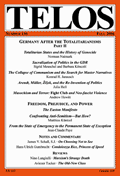Each Tuesday in the TELOSscope blog, we reach back into the archives and highlight an article whose critical insights continue to illuminate our thinking and challenge our assumptions. Today, Marcus Michelsen looks at Jean-Claude Paye’s “From the State of Emergency to the Permanent State of Exception,” from Telos 136 (Fall 2006).
 How long ago was 9/11? Is this really a new era? What does it look like? For many, for perhaps all of us, the terrorist attacks eight years ago came as a surprise and brought us to question our understanding of the world around us. Our answers have emerged in renewed and reinvigorated passions for social and international justice. Collectively, however, there is no one vision we can all subscribe to. Some blame the United States for the terrorist attacks; others call for the government to hunt down the terrorists and kill them. In the heat of the moment, emotions flare and opinions are erratic.
How long ago was 9/11? Is this really a new era? What does it look like? For many, for perhaps all of us, the terrorist attacks eight years ago came as a surprise and brought us to question our understanding of the world around us. Our answers have emerged in renewed and reinvigorated passions for social and international justice. Collectively, however, there is no one vision we can all subscribe to. Some blame the United States for the terrorist attacks; others call for the government to hunt down the terrorists and kill them. In the heat of the moment, emotions flare and opinions are erratic.
But perhaps it has been long enough for the dust to settle in our emotional lives to reconsider what kind of break 9/11 constitutes with respect to the past, and to revisit our government’s actions with renewed empathy and criticism. We are, of course, still embroiled in two foreign wars in Afghanistan and Iraq, but those have not been in the public eye so much after Obama’s election. Even further from the spotlight, thousands of pages of documents contain hundreds of laws that were passed to empower the government in its fight against terrorism. What is the status of those laws now? How do we feel about them?
Because 9/11 was so shocking, it is difficult to come up with a theoretical perspective that does justice to the event. Yet the nature of the event has itself become a matter of political concern. On account of what it represents, 9/11 has justified the introduction of an entirely new dimension of executive power. The fairness of the newly anointed power rests on how that event is interpreted.
According to Jean-Claude Paye, in his article “From the State of Emergency to the Permanent State of Exception,” from Telos 136 (Fall 2006), “[t]he intent of the government when it introduced the Patriot Act was to point to a rupture that had occurred, to establish a boundary between a before and an after September 11, 2001. The crossing of this boundary on September 11 thus, in effect, compels the population to consent to the relinquishment of its individual liberties.” Paye’s careful presentation of the shift in power from the judicial to the executive branch of the U.S. government invites us to reconsider whether we are making the right kinds of sacrifices in our quest to resolve our anxieties about the future. What started as a state of emergency has become, according to Paye’s analysis, a permanent state of exception of questionable value.
Consider the following passage from the article:
While the attempts of the government to increase the prerogatives of the FBI through the reauthorization of the Patriot Act failed overall, it did succeed in imposing, amidst an almost general indifference, the establishment of a new police force whose function is quite openly to take away public freedoms, such as the freedom to assemble or demonstrate. Section 605 of the Patriot Act Reauthorization creates a new federal police force, which has the power to “make arrests without warrant for any offense against the United States committed in their presence, or for any felony cognizable under the laws of the United States if they have reasonable grounds to believe that the person to be arrested has committed or is committing such felony.”
This new police force, which is directly under the authority of the Secretary of Homeland Security, is assigned a variety of jurisdictions, including “a special event of national significance.” These terms are not defined. They do not imply the presence of a ‘protected person,’ such as a president. It is thus the administration, more specifically the police, which designates the event as having a “national significance.” Consequently, the police can proceed with arrests at its pleasure.
Paye’s article raises questions of crucial importance concerning the government’s right to intervene into our lives, and those of others, that we must revisit in order to evaluate our response to 9/11 and our current political situation, and to think carefully about the right path forward.
Read the full version of Jean-Claude Paye’s “From the State of Emergency to the Permanent State of Exception” at the TELOS Online website. If you are affiliated with an institution that is an online subscriber to Telos, you have free access to our complete online archive. If not, you can purchase 24-hour access to this and other Telos articles at the low rate of $5/article.








